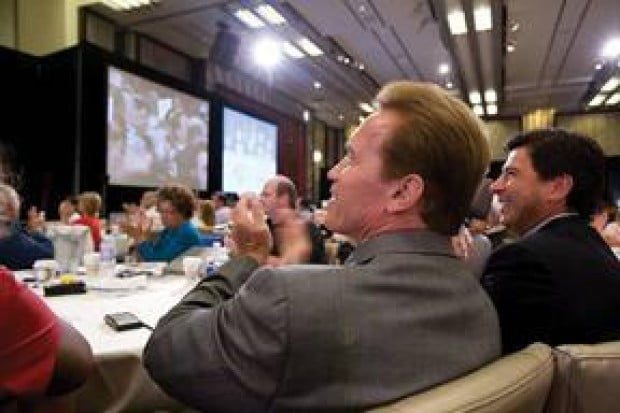
Pepperdine professors promote citizens’ assemblies to address California’s health
care system.
By Melonie Magruder / Special to The Malibu Times
The first live forum and discussion CaliforniaSpeaks, hosted by a new bipartisan group called Common Sense California, took place Saturday in Hollywood to discuss one of the most pressing topics facing Californians today: the healthcare system.
Discouraged by the increasing gridlock in the state’s Capitol, Pete Peterson, adjunct professor at Pepperdine University’s School of Public Policy, and David Davenport, distinguished professor of public policy at Pepperdine (and former university president, 1985-2000) and a research fellow at the Hoover Institution, helped form Common Sense California in an effort to encourage and facilitate citizen involvement in state government.
Believing that “of the many critical problems facing California, the one that prevents progress on all the others is the profound disconnection between citizens and their policy leaders,” Common Sense decided to host CaliforniaSpeaks.
“This was our first citizen’s caucus event,” Peterson said. “We hope it’s the first of many.”
The goal was to assemble a cross section of California’s diverse population across income, gender, age and ethnicity to discuss the state’s health care system.
Or, as organizer Carolyn Lukensmeyer said when quoting veteran newsman Walter Cronkite on the subject, “It’s not healthy, caring has nothing to do with it and it sure as hell isn’t a system.”
Lukensmeyer is the founder of America Speaks, a nonprofit organization dedicated to engaging citizens in public decisions that impact their lives.
To facilitate this objective, America Speaks developed an efficient methodology of inviting citizens from targeted demographics and bringing them together for a day-long conference in which their ideas, concerns, beliefs and demands are all digitally recorded and collated into one manifesto to be presented to state legislators.
Common Sense California tasked Lukensmeyer with staging the CaliforniaSpeaks event in eight locations across the state, from Humboldt County to San Francisco to Los Angeles to San Diego, and developing an informed consensus to the question, “What is necessary to fix the current healthcare system?”
“CaliforniaSpeaks is not just about giving citizens a voice,” Peterson said. “We want to provide a forum to allow the public to come together and make informed decisions on policies that affect them. This is deliberative democracy.”
The forum was staged in the Grand Ballroom of the Kodak Theater complex with plenty of input from legislators around the state. Gov. Schwarzenegger made an appearance, momentarily putting aside his differences with Assembly Speaker Fabio Nuñez to address together the state of healthcare in California.
“Today, there are six and a half million uninsured people in California,” the governor said. “We are paying for these uninsured through a ‘hidden tax’ with our rising premiums and exploding healthcare costs. To fix our healthcare, we must share ideas. If you let your legislators know how much you care about healthcare reform, they will work to fix it and not hold up the budget.”
Nuñez agreed. “Healthcare premiums have risen two and a half times the inflation rate,” he said. “But you can’t have insurance if there’s not a premium you can afford. Insurance companies are ruining the healthcare system today. That’s why, before the end of this legislative session, we will agree to a healthcare package in Sacramento.”
The invited participants of more than 4,000 Californians were given a crash course in Health Care 101, which included discussions on employer and government responsibilities, insurer protocols, legislative options and plans for moving forward.
At each step, trained facilitators at round tables received input and personal stories and transmitted them to the central data bank. Responses were diverse and passionate.
Marianne Cotter is a journalist from Santa Monica and said she welcomed the chance to participate in the event. “I’m hoping this reaches our legislators,” she said. “I am experiencing a personal health insurance problem so this is critical for me right now. I’m between jobs and can’t afford COBRA. I’ve been turned down by all the private insurance plans so if I get sick, I don’t know what I’ll do.”
America spends more per capita on its citizens’ health care than any other industrialized nation at more than $6,000 per person, nearly twice that of countries with comprehensive health plans for all its citizens. Yet, California still has more than 45 million uninsured Americans.
Lukensmeyer’s statistics were sobering. “California has the eighth largest economy in the world, yet nearly 77 percent of Californians are worried they can’t pay their health bills,” she said.
To underscore this point in the broadest sense of irony, one of the event’s participants became ill while registering Saturday morning. He refused to be transported to the hospital because, Lukensmeyer said, “He was concerned about the out-of-pocket expense for an ambulance.”
Apparently, Saturday’s 4,000 representative constituents agreed there was a problem. Eighty-two percent said “major changes” were required to fix California’s healthcare system, with 51 percent agreeing that some sort of single payer plan was the solution.
Peterson said the tabulated results of the conference would be presented to representatives from the governor’s office and the Legislature before the next session begins.
“What I find encouraging is that this methodology allows people with different viewpoints to sit down face to face and hash out a citizen’s solution without some kind of political agenda,” Peterson said. “So you have a socialized medicine guy and a free market guy come together and, by the end of the day, they can formulate a consensus that serves everybody and present it to our elected officials. This is informed deliberation and this is what our democratic republic needs.”
To learn more about this event or to find out about legislative options for health care reform, visit the Web Sites www.californiaspeaks.org or www.FixOurHealthcare.ca.gov.
